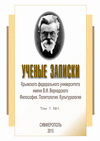Vestimential fashion, one of the most important phenomena of the modern world, has become the subject of research in various fields of humanitarian knowledge, but for philosophy this object remains of secondary importance. Of course, fashion as a complex systemic object requires a comprehensive study, but one should not forget its foundations, which consist in the realization of the aesthetic ideals of its time. Developing from a simple perception of beauty to the formation of an attitude towards it and awareness of it as an object of cognition, internally enriching itself with a supra-biological level of activity, a utilitarian, fundamentally objective human activity develops. Perception, awareness and creation, which make up the analytical and cognitive activity of a person, determine the emergence of a value orientation in the consciousness of the subject, which allows to bring the subject activity into the space of aesthetic culture. For the full-fledged formation of the fashion process, there had to be a transformation from a person’s mode of action into the goal of his actions, the conditions for him were formed by the Renaissance. The final establishment of fashion as a system occurred during the development of capitalism, which brought the forms of culture in line with its worldview and forms of production. The current state of fashion is the most remote from all previous centuries, since it has revised all established aesthetic ideals, at the same time, history provides examples of renewal during periods of transition of epochs, the crisis of which contributes to a rethinking of aesthetic norms. Fashion, as a phenomenon in perpetual dynamics, which has declared novelty as its fundamental value, demonstrates great transformative potential precisely in times of crisis.
aesthetics, beauty, beauty, aesthetic activity, fashion, activity, ideal
1. Kuznecova T.V. Dialektika esteticheskogo: universal'noe i svoeobraznoe. M.: Izdatel' A.V. Vorob'ev, 2022.
2. Kos'kov M.A. Estetika predmetnyh form: monografiya. SPb.:LGU im. Pushkina, 2014.
3. Kiloshenko M.I. Psihologiya mody: teoreticheskiy i prikladnoy aspekty. SPb.: SPbGUTD, 2001.
4. Kormin N.A. Cogito ergo sum: postanovka esteticheskogo suschestvovaniya. // Fi-losofiya i kul'tura. 2018. № 6. S. 39–47. DOI:https://doi.org/10.7256/2454-0757.2018.6.26130
5. Iliadi A.I. Esteticheskaya deyatel'nost'. Problemy etiki i estetiki. Vyp. 3. Problema potrebnostey v etike i estetike. L., 1976.
6. Kagan M.S. Estetika kak filosofskaya nauka. SPb.: Petropolis,1997.
7. Lipoveckiy Zh. Moda i ee sud'ba v sovremennom obschestve. Per. s fr. Yu. Rozenberg, M.: NLO, 2012.
8. Batkin L.M. Evropeyskiy chelovek naedine s soboy. Ocherki o kul'turno-istoricheskih osnovaniyah i predelah lichnogo samosoznaniya. M.: RGGU, 2000.
9. Svendsen L. Filosofiya mody. Per. s norv. A. Shipunova. M.: Progress-Tradiciya, 2007.
10. Gegel' G. V. F. Fenomenologiya duha. M: Nauka, 2000.
11. Bonito O. Ak. Iskusstvo na ishode vtorogo tysyacheletiya. M.: Hudozhestvennyy zhurnal, 2003.
12. Bart R. Mifologii. Per. s fr., vstup. st. S. Zenkina. 4-e izd. M.: Akademicheskiy proekt, 2017.
13. Kruglov A. Massovaya kul'tura. // Zdravyy smysl. №5, 1997. – C. 27–31.
14. Krivcun O. A. Estetika. 3-e izd. pererab. i dop. M.: Yurayt, 2023.





